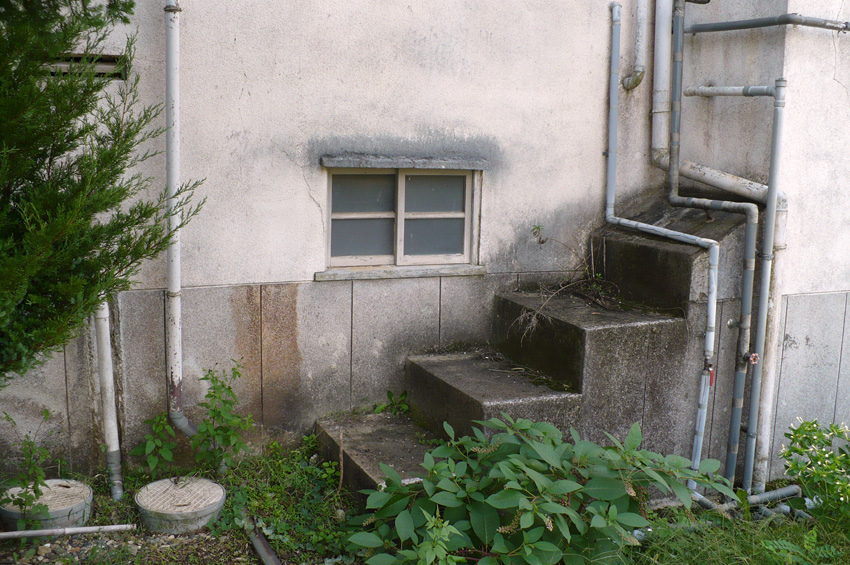I capitalised it in the title because of its etymology, and for emphasis. I think I would use lower case in regular usage.
More examples:
https://www.messynessychic.com/2017/01/18/the-inexplicably-fascinating-secret-world-of-thomassons/
https://kyotojournal.org/kyoto-notebook/kyoto-tomason-the-hunt-for-hidden-hyperart/
https://www.amusingplanet.com/2017/04/thomasson-architectural-relics-that.html
https://commons.wikimedia.org/wiki/Category:Hyperart_Thomasson
A nice concept for art, but I feel bad for the person after which it’s named. It was maybe funny at first but this poor dude can’t catch a break. So yeah maybe a new name, just hyper art? No need to bully this baseball player and his family for being useless.
The Abe Sada
(Japanese: Abe Sada 阿部定)
The remains of a telephone pole cut down. The name refers to the Abe Sada Incident; a famous case from 1930s Japan in which a woman strangled her lover and then severed his genitalia with a kitchen knife.
I’m not sure why you posted this here, but I just wanted to thank you because I’m halfway through this wiki and it’s crazy as fuck.
Once you finish reading you’ll know why.
There’s a bunch of these in northern Ontario small towns.
The mysterious unused, non functional, only decorative … front door.
It’s funny because there are some old houses up here where they even just remove the front step and front deck and the front door just lingers in the air doing nothing. Inside, the entire front living room area has been rearranged to the point where the old front door is just permanently shut, sealed and never opened and furniture placed in front of it. This was a lot more common about 20 years ago but lately they seem to be disppearing as people realize that is just too silly.
I think part of it is that because we live in the north and part of the year leaves us with big mounds of snow in the winter, everyone just prefers to use the back door. The back door is easier and more convenient in the winter time. If you used the front door, you blow in cold air (even if you have porch) into the main living area and then you track in snow, which melts and creates puddles of water. Plus a regularly open and closing door in the winter time eventually gets lined with frost and ice from the constant freezing the thawing.
The same thing happens at the back door but the back door is usually next to the kitchen, hallway or storeroom. And the back door usually leads into a big ugly porch, maybe even a second porch where everyone can dump their winter clothes, boots and outdoor gear before walking into the main part of the house.
English Wikipedia has been down all day. Very, very rarely do I take anything for granted, and yet, I felt a pit in my stomach when I saw a blank page. It’s funny to realize just how much of a fixture in my life Wikipedia has been.
Ok, this is really cool. I’m definitely going to look for Thomasson around my area.
I grew up in a part of the northern Midwest where just about every house built before the 1940’s has a small steel door in the foundation, usually on the same side as the driveway. It was used to deliver coal which was shoveled through the door, into a bin in the basement and eventually burned to heat the house, most likely in a big “octopus” furnace or a boiler.
It always fascinated me that so many houses had this one little thing that was once an incredibly necessary feature that was eventually shut and sealed from the inside, probably never to be opened again.
Is that a regional thing? In my part of Europe virtually 60-70+ year old house comes standard with it. But the fact that English lacks a word for “soupirail” (or that Wikipedia only has a page in French and Dutch) leads me to believe it might not be a very widespread practice outside of Western Europe.
It often gets repurposed as an air vent, for general ventilation and/or as a clothes dryer exhaust. I rarely see them permanently blocked out.
I’ve heard it referred to as a “coal chute”. They were probably common in quite a few regions in the US. North/Midwest and North East if I had to guess. Those are areas with lots of houses that were built in the late 1800’s - early 1900’s when central heating was really becoming commonplace. Houses would have typically had a basement and the town would have needed rail access to supply the sheer volume of coal needed.
I think oil became a more common fuel source after WWII because it was cheaper and easier to handle. Lots of the same houses with those little doors also have a small hole that someone cut in the middle of the basement stairs so they could fill the oil tank that was installed under the stairs. Gravity furnaces were not very efficient but they were easy to convert to oil burning.
I love things like this.
There was a set of brick stairs leading up into a giant hedge full of brambles in my hometown. Straight from the pavement up and you couldn’t see the end.
Fascinated us as kids.
I know a guy with this last name who totally fits this description





